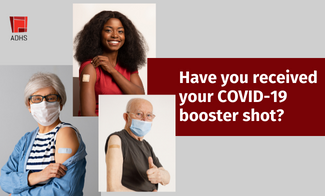 Do you remember when you got your last COVID-19 vaccination?
Do you remember when you got your last COVID-19 vaccination?
If it has been more than five months since you completed your primary vaccination series, it’s time for you to get your booster. You may be eligible even sooner depending which vaccine you received. If you are over the age of 50 and received your first booster at least four months ago, you’re eligible for a second booster. A second booster is also recommended for those 12 and older who have compromised immune systems.
Unfortunately, some people are putting off getting their booster.
I understand why, especially if you experienced side effects during your initial vaccine series. It’s hard to find a good time in your busy life to feel a bit under the weather, even if it’s a sign that your body’s immune response is working. Having said that, many people have no side effects whatsoever, and most of those who do experience side effects get back to normal in a couple days.
The science shows that while COVID-19 vaccines are staggeringly good at keeping you out of the hospital, that protection wanes over time. Boosters work by reminding the immune system how to recognize and fight the coronavirus. Once your system is trained up, your COVID-fighting antibodies will more readily identify new variants – including the Omicron BA2 subvariant.
By reducing your risk of infection, the booster also reduces the likelihood that you will spread the virus to others. While breakthrough infections are possible even with a booster, as long as your vaccination status is up to date, you are likely to have much lower viral loads than otherwise.
The bottom line is that getting your booster strengthens your community and helps keep you and the people you love safe and healthy. You’ll need your COVID-19 vaccination card. If you have misplaced it, you can request your vaccine record using the Arizona Department of Health Services (ADHS) Immunization Record Request Form.
I recently participated in an online town hall organized by AARP Arizona to discuss the importance of staying up to date on your booster dose. I was happy to answer questions and share how being up to date with a booster dose is especially important for those 65 and older. That’s because their immune systems don’t work as well as they did when they were young.
My message to you is the same: Get boosted and join nearly 100 million Americans who are keeping their COVID-19 vaccination status up to date.
If you or someone you love is immunocompromised, you should review the full CDC guidance on the recommended booster schedule for this population. In short, people who are immunocompromised and received a full two-dose Johnson & Johnson primary series should get a booster at least two months after the second dose. Those who received a three-dose Pfizer or Moderna primary series are eligible for a booster at least three months after their third dose.
Cases have dropped dramatically from the Omicron peak in January, but COVID-19 is still in the community and isn’t done with us. Vaccines and boosters have proven again and again to be remarkably effective at preventing severe illness and death from COVID-19. To protect yourself and others, I strongly recommend finding a provider at azhealth.gov/FindVaccine getting boosted as soon as possible.










